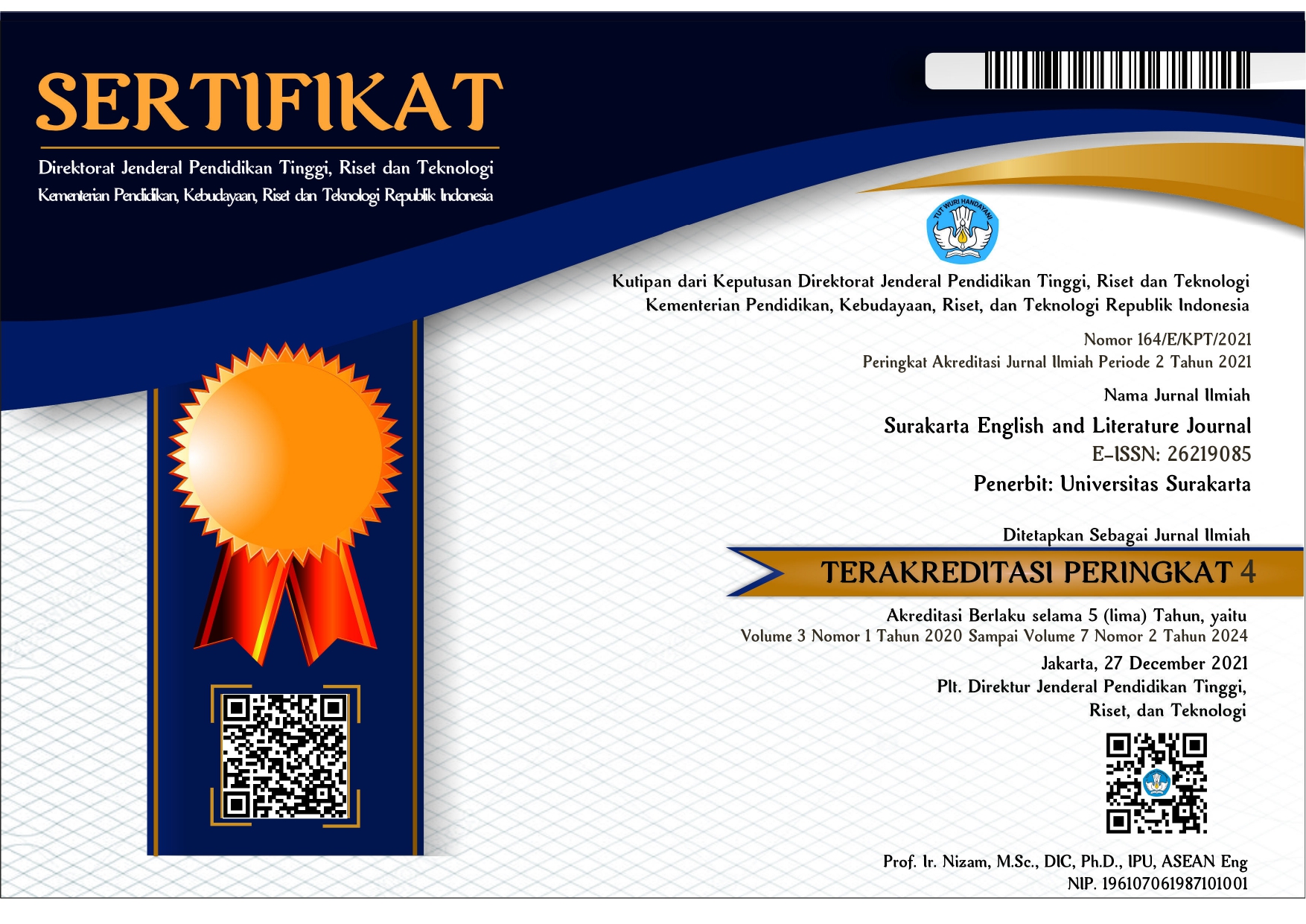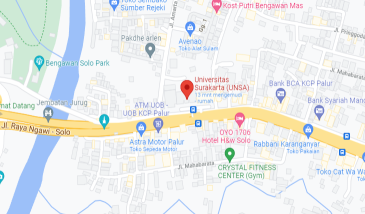The Benefits of out-of-class English Exposures on Undergraduate Students' English Mastery
DOI:
https://doi.org/10.52429/selju.v6i2.125Keywords:
Acquisition; Exposure; Learning.Abstract
This research aims to determine the benefits of outside-classroom English Exposure on undergraduate students’ English mastery. This research involves 50 undergraduate students from batch 2017-2019 filling out a questionnaire related to English Exposures that they have gotten outside the classroom. Through the analyzed questionnaire, 5 undergraduate students were chosen for the interview to have deeper information. Considering the pandemic situation, the discussions were done by using Zoom meetings. The findings showed that English Exposure was beneficial for undergraduate students’ English mastery. The benefits were the improvement of undergraduate students’ pronunciation, grammar, vocabulary, listening skills, etc. From the study, YouTube was the most popular platform where undergraduate students got English Exposure since it had many videos that elicited students’ interest. Looking at the benefits of English Exposure, teachers should combine their lessons with contemporary media to improve students’ English mastery and spark students’ interest in English lessons.
References
Butler, Y. G. (2014). Parental factors and early English education as a foreign language: a case study in Mainland China. Research Papers in Education, 29(4), 410–437. https://doi.org/10.1080/02671522.2013.776625
Butler, Y. G. (2015). English language education among young learners in East Asia: A review of current research (2004–2014). Language Teaching, 48(3), 303–342. https://doi.org/10.1017/S0261444815000105
Butler, Y. G., & Le, V.-N. (2018). A longitudinal investigation of parental social-economic status (SES) and young students’ learning of English as a foreign language. System, 73, 4–15. https://doi.org/10.1016/j.system.2017.07.005
Chesterfield, R., Hayes-Latimer, K., Chesterfield, K. B., Chávez, R., & Chavez, R. (1983). The Influence of Teachers and Peers on Second Language Acquisition in Bilingual Preschool Programs. TESOL Quarterly, 17(3), 401. https://doi.org/10.2307/3586255
Du, X. (2009). The Affective Filter in Second Language Teaching. Asian Social Science, 5(8). https://doi.org/10.5539/ass.v5n8p162
Ferdous, T. (2013). Use of English beyond the classroom wall: a study of undergraduate students’ out-of-class English learning activities. Department of English and Humanities, BRAC University. http://hdl.handle.net/10361/2760
Gardner, R. C., Lalonde, R. N., & Moorcroft, R. (1985). THE ROLE OF ATTITUDES AND MOTIVATION IN SECOND LANGUAGE LEARNING: CORRELATIONAL AND EXPERIMENTAL CONSIDERATIONS. Language Learning, 35(2), 207–227. https://doi.org/10.1111/j.1467-1770.1985.tb01025.x
Gass, S. M., & Mackey, A. (2020). Input, Interaction, and Output in L2 Acquisition. In Theories in Second Language Acquisition (pp. 192–222). Routledge. https://doi.org/10.4324/9780429503986-9
Harjanto, I., Lie, A., & Wijaya, J. (2019). Home, school, and community’s effects on Indonesian secondary students’ self-identity changes. Indonesian Journal of Applied Linguistics, 9(2). https://doi.org/10.17509/ijal.v9i2.20232
Huang, B. H. (2016). A synthesis of empirical research on the linguistic outcomes of early foreign language instruction. International Journal of Multilingualism, 13(3), 257–273. https://doi.org/10.1080/14790718.2015.1066792
Ivars Olmedo, M. (2015). English Language Learning Beyond the Classroom Walls. http://hdl.handle.net/2445/95811
Kennedy, G. (1973). Condition for Language Learning.
Krashen, S. D. (1982). Principles and Practice in Second Language Acquisition.
Lindemann, S. (2005). Who speaks “broken English”? US undergraduates’ perceptions of non-native English1. International Journal of Applied Linguistics, 15(2), 187–212. https://doi.org/10.1111/j.1473-4192.2005.00087.x
MacLeod, F., & Larsson, P. (2011). Exposure to English outside the Classroom. Independent Thesis Basic Level (Professional Degree), Student Thesis.
Mohsin, M. (2020). 10 Social Media Statistics You Need to Know in 2020 [Infographic].
Muñoz, C. (2012). Intensive Exposure Experiences in Second Language Learning (C. Muñoz, Ed.). Multilingual Matters. https://doi.org/10.21832/9781847698063
Omoera, O. S., Aiwuyo, O. M., Edemode, J. O., & Anyanwu, B. O. (2018). Impact of Social Media on the Writing Abilities of Ambrose Alli University Undergraduates in Ekpoma-Nigeria. GiST Education and Learning Research Journal, 17, 59–80. https://doi.org/10.26817/16925777.412
Peters, E. (2018). The effect of out-of-class exposure to English language media on learners’ vocabulary knowledge. ITL - International Journal of Applied Linguistics, 169(1), 142–168. https://doi.org/10.1075/itl.00010.pet
Rubin, D. L. (1992). Nonlanguage factors affecting undergraduates’ judgments of non-native English-speaking teaching assistants. Research in Higher Education, 33(4), 511–531. https://doi.org/10.1007/BF00973770
Safranj, J. (2015). Advancing Listening Comprehension Through Movies. Procedia - Social and Behavioral Sciences, 191, 169–173. https://doi.org/10.1016/j.sbspro.2015.04.513
Saputri, F. R., & Purnawarman, P. (2019). The English Contact in Leisure Activities of Indonesian Students Majoring in English. International Academy of Science, Engineering, and Technology, 39–48.
Chen, S., Zhao, J., de Ruiter, L., Zhou, J., & Huang, J. (2020). A burden or a boost: The impact of early childhood English learning experience on lower elementary English and Chinese achievement. International Journal of Bilingual Education and Bilingualism, 1–18. doi:10.1080/13670050.2020.1749230
Spada, N., & Lightbown, P. M. (1989). Intensive ESL Programmes in Quebec Primary Schools. TESL Canada Journal, 7(1), 11. https://doi.org/10.18806/tesl.v7i1.557
SUN, H., STEINKRAUSS, R., TENDEIRO, J., & DE BOT, K. (2016). Individual differences in very young children’s English acquisition in China: Internal and external factors. Bilingualism: Language and Cognition, 19(3), 550–566. https://doi.org/10.1017/S1366728915000243
Swain, M. (1993). The Output Hypothesis: Just Speaking and Writing Aren’t Enough. The Canadian Modern Language Review, 50(1), 158–164. https://doi.org/10.3138/cmlr.50.1.158
Tonoian, L. (2014). English Language Learning Inside and Outside the Classroom in Portugal. Published Masters Dissertation). New University of Lisbon, Lisbon, Portugal.
Zhang, W., & Hu, G. (2008). Second Language Learners’ Attitudes Toward English Varieties. Language Awareness, 17(4), 342–347. https://doi.org/10.1080/09658410802147337
Downloads
Published
How to Cite
Issue
Section
License
Copyright (c) 2023 Wina Chandrella

This work is licensed under a Creative Commons Attribution-ShareAlike 4.0 International License.
Licensing for Data Publication
-
Open Data Commons Attribution License, http://www.opendatacommons.org/licenses/by/1.0/ (default)
-
Creative Commons CC-Zero Waiver, http://creativecommons.org/publicdomain/zero/1.0/
-
Open Data Commons Public Domain Dedication and Licence, http://www.opendatacommons.org/licenses/pddl/1-0/














